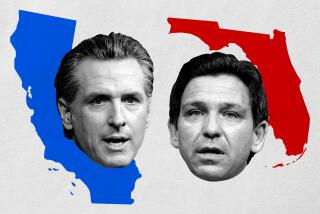Rivals Test Florida’s Southern Hospitality
- Share via
PLANT CITY, Fla. — It wasn’t the build-your-own strawberry shortcake that brought George W. Bush to this “winter strawberry capital of the world.”
It wasn’t even Florida’s Republican presidential primary, although that counted for something.
With the outcome of today’s balloting in Florida and five other states a foregone conclusion, Bush and his Democratic rival, Al Gore, have started campaigning with their eyes on November. And no place looms larger in their sights than Florida.
Of the four most populous states, only Florida was seriously contested in the last two presidential campaigns. With Texas a lock for Gov. Bush and New York and California looking increasingly solid for Gore, that could very likely be the case again this election.
“The bottom line is, they both think they can win,” said Susan MacManus, who teaches political science at the University of South Florida. “It is going to be competitive.”
Rivals Locked in Battle
A poll last week showed the two presumptive nominees essentially tied in Florida; other surveys have shown Bush ahead, but with the vice president closing in. Each came courting Florida in recent days and both plan to return often.
The vice president visited a Miami teaching hospital Monday, where he attacked Bush on health care. The Texan campaigned Sunday at the 65th annual Strawberry Festival near Tampa, working the crowd with Florida’s Republican governor, who also happens to be his kid brother, Jeb.
Still, Jeb Bush’s support comes at a cost, namely the backlash against an anti-affirmative action initiative that has antagonized black voters and thrust the divisive issue into the presidential race here. The proposal eliminates preferences in favor of a system automatically granting state university admission to the top 20% of each high school class, regardless of race or gender. Jeb Bush predicted his plan will boost minority enrollment by November “and that’ll take it off the map as a political wedge issue.”
Others aren’t so sure. “That has solidified Democrats in this state,” said independent pollster Jim Kane, who suggested that initiative could boost black turnout to the detriment of the GOP.
Win or lose the state in November, Gore could benefit from a competitive Florida contest by forcing Bush to spend time and money he would rather devote elsewhere, such as the Midwest or California. “If we get into a scenario where we make him come [to Florida] and defend his position, we really shut him down in terms of strategic options,” said one Gore strategist.
Others agree. “Bush ought to be able to carry Florida,” said Emory University’s Merle Black, an expert on Southern politics. “If he can’t, he’s not going to win the election.”
Florida to Play Pivotal Role
The two campaigns are months away from finalizing their state-by-state strategies. But each starts with certain shared assumptions. In the South, Bush is virtually assured of winning Mississippi, Alabama, South Carolina and probably Virginia along with his home state of Texas.
Louisiana and Kentucky start out leaning toward Bush and Tennessee toward native son Gore. Handicappers give the vice president an outside shot in North Carolina. That leaves Arkansas, Georgia and Florida as the region’s most competitive states. Florida’s 25 electoral votes--more than all but three other states--make it unquestionably the most tempting target.
Florida Gov. Bush acknowledges the fight will be fierce. “I don’t think Vice President Gore is going to lay down,” he said. “George is going to get elected, but it’s going to require a lot of hard work.”
With its sprung-from-nowhere subdivisions and large percentage of residents born someplace else, Florida is easily the least Southern and least tradition-bound of the old Confederate states.
From the “Redneck Rivera” of the western Panhandle to Miami’s Little Havana, Florida is a place almost willfully difficult to classify. Its cultural and political extremes make it seem less a whole than the sum of disparate parts, with little tying the state together beyond a go-go mentality and the year-round abundance of sunshine.
Like the rest of the South, Florida has evolved from a solidly Democratic state to one that is increasingly Republican. The two major parties are now roughly equal in voter registration. But in presidential contests, Florida has defied the regional trend toward the GOP. Bill Clinton barely lost to George Bush in 1992 and beat Bob Dole here in 1996.
“Clinton proved [Florida] can go Democratic, if you have the right formula,” said pollster Kane, who publishes Florida Voter, a nonpartisan newsletter in Fort Lauderdale.
Gore has reprised many of the issues that worked so well for Clinton, emphasizing Democratic plans to “protect” Social Security and Medicare and touting his proposal to create a prescription drug benefit for the elderly. Already, Gore has attacked Bush’s proposed tax cut as a danger to the health care programs that are vital to Florida’s many elderly voters.
“He has no plan to expand access to health care, no plan to have a national ‘patients bill of rights,’ no plan to give seniors help with prescription drugs,” Gore asserted Monday, to cheers from doctors and nurses at the University of Miami’s teaching hospital.
Bush accuses Gore of using scare tactics. “That’s the kind of politics America is sick of,” he said. “I’m going to remind people this is the administration that’s had seven years to modernize, save and secure Social Security and Medicare, and they have done nothing.”
Florida’s large senior population could be key to the outcome in November. Voters 60 and older made up 42% of the electorate in the 1998 governor’s race, according to MacManus. While voters 65 and older are solidly Democratic, those between 55 and 65 are more evenly split between the two major parties.
Moreover, older women--who strongly backed Clinton in 1996--were some of the most offended by the Monica S. Lewinsky scandal, repeated surveys found. Count Elsie Butler among the aggrieved.
A registered Democrat, she praised Clinton’s stewardship of the economy but said, “His morals stink.” And even though she frets about Bush’s handling of entitlement programs--”I don’t want him to mess with Social Security because I’ll be there before too long”--the 59-year-old clerical worker still plans to vote for the Texan in November. “I like his dad,” she added as she stood near a cotton candy stand, hoping to catch a glimpse of Bush at Sunday’s berry fest.
Another group that Gore probably shouldn’t count on is Cuban Americans, a normally Republican bloc that supported Clinton in unusually high numbers four years ago. The controversy over Elian Gonzalez, the 6-year-old Cuban boy at the center of an international custody feud, has turned Cuban Americans against the Clinton administration with a vengeance. “In a close race, that could make a major difference between winning the state and losing it,” said pollster Kane.
In addition to Florida, the other states holding primaries today are Louisiana, Mississippi, Oklahoma, Tennessee and Texas.
(BEGIN TEXT OF INFOBOX / INFOGRAPHIC)
Profile: Florida
Population: 14.9 million (1998 est.)
Population by race and ethnicity:
*
REGISTERED VOTERS
8.2 million (1998)
(Democrats: 45%; Republicans: 40%; Unaffiliated and minor parties: 15%)
*
1996 PRESIDENTIAL VOTE
Bill Clinton (D) ........2,545,690 (48%)
Bob Dole (R) ...........2,242,951 (43%)
Ross Perot (I) .............483,761 (9%)
*
1992 PRESIDENTIAL VOTE
George Bush (R) .......2,171,781 (41%)
Bill Clinton (D) ..........2,071,651 (39%)
Ross Perot (I) ...........1,052,481 (20%)
*
Republican convention delegates: 80
Democratic convention delegates: 161
Source: Almanac of American Politics, 2000
More to Read
Get the L.A. Times Politics newsletter
Deeply reported insights into legislation, politics and policy from Sacramento, Washington and beyond. In your inbox three times per week.
You may occasionally receive promotional content from the Los Angeles Times.











